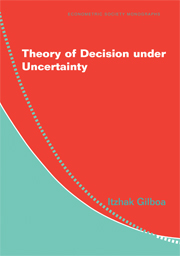19 - Frequentism Revisited
Published online by Cambridge University Press: 05 January 2013
Summary
SIMILARITY-WEIGHTED EMPIRICAL FREQUENCIES
Consider the physician problem (Example (3) in Chapter 1) again, and (as opposed to the previous chapter), insist that the physician provide probabilistic predictions. As mentioned earlier, it is an example where many causally independent observations exist. They were not obtained under “identical” conditions, and so a frequentist definition of probability would not be a viable alternative in this case. The physician has already told me that if I insist on measuring everything, I will find that I am a unique case in human history and that no data were yet collected about me. Yet, there are past cases that are more and less similar to mine. A rather natural idea is to suggest that the notion of empirical frequencies be used, but with weights, such that a more similar case will have a higher weight in the calculation of the relative frequency than a less similar case.
To be more concrete, let the variable of interest be y ∈ {0, 1}, indicating success of a medical procedure. The characteristics of patients are x = (x1, …, xm). These variables are real valued, but some (or all) of them may be discrete.
- Type
- Chapter
- Information
- Theory of Decision under Uncertainty , pp. 180 - 187Publisher: Cambridge University PressPrint publication year: 2009



